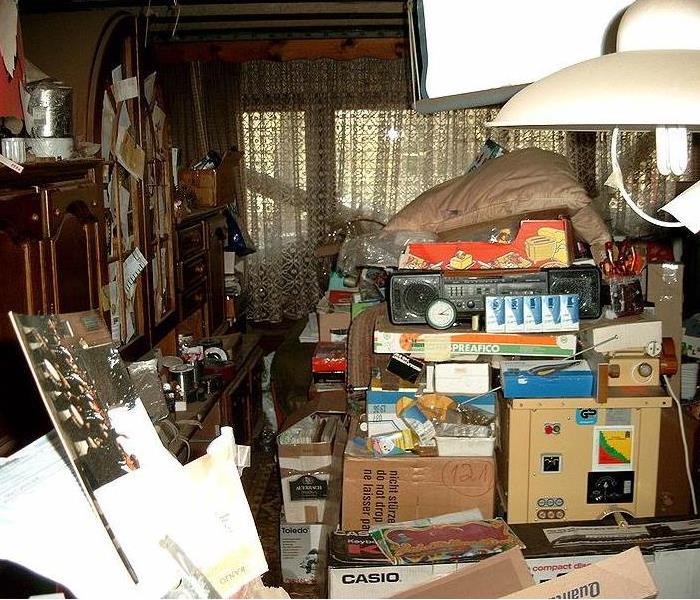The Facts about hoarding
10/12/2018 (Permalink)
Here at SERVPRO of Lebanon/Hanover/Littleton; We frequently get asked about
hoarding and the clean up process. In lieu of just going over the cleaning
process, Lets go over some facts about hoarding,So that if you are ever faced
with this situation; You may find yourself in a better position to help.
According to the "International OCD Foundation":
What is compulsive hoarding?
Compulsive hoarding includes ALL three of the following:
- A person collects and keeps a lot of items, even things that appear useless
or of little value to most people, and - These items clutter the living spaces and keep the person from using their
rooms as they were intended, and - These items cause distress or problems in day-to-day activities.
How is hoarding different from collecting?
- In hoarding, people seldom seek to display their possessions, which are
usually kept in disarray. - In collecting, people usually proudly display their collections and keep them
well organized.
What are the signs of compulsive hoarding?
- Difficulty getting rid of items
- A large amount of clutter in the office, at home, in the car, or in other
spaces (i.e. storage units) that makes it difficult to
use furniture or appliances or move around easily - Losing important items like money or bills in the clutter.
- Feeling overwhelmed by the volume of possessions that have ‘taken over’ the
house or workspace. - Being unable to stop taking free items, such as advertising flyers or sugar
packets from restaurants. - Buying things because they are a “bargain” or to “stock up”
- Not inviting family or friends into the home due to shame or embarrassment.
- Refusing to let people into the home to make repairs.
What makes getting rid of clutter difficult for hoarders?
- Difficulty organizing possessions
- Unusually strong positive feelings (joy, delight) when getting new items.
- Strong negative feelings (guilt, fear, anger) when considering getting rid of
items. - Strong beliefs that items are “valuable” or “useful”, even when other people
do not want them. - Feeling responsible for objects and sometimes thinking of inanimate objects
as having feelings. - Denial of a problem even when the clutter or acquiring clearly interferes
with a person’s life
Who struggles with hoarding behavior?
Hoarding behaviors can begin as early as the teenage years, although the
average age of a person seeking treatment for
hoarding is about 50. Hoarders often endure a lifelong struggle with hoarding.
They tend to live alone and may have a
family member with the problem. It seems likely that serious hoarding problems
are present in at least 1in 50 people, but
they may be present in as many as 1 in 20.
Are hoarding and obsessive compulsive disorder (OCD) related?
Compulsive hoarding was commonly considered to be a type of OCD. Some estimate
that as many as 1 in 4 people with
OCD also have compulsive hoarding. Recent research suggests that nearly 1 in 5
compulsive hoarders have non-hoarding
OCD symptoms. Compulsive hoarding is also considered a feature of obsessive
compulsive personality disorder (OCPD)
and may develop along with other mental illnesses, such as dementia and
schizophrenia.
What kinds of things do people hoard?
Most often, people hoard common possessions, such as paper (e.g., mail,
newspapers), books, clothing and containers (e.g.,
boxes, paper and plastic bags). Some people hoard garbage or rotten food. More
rarely, people hoard animals or human
waste products. Often the items collected are valuable but far in excess of
what can reasonably be used.
What are the effects of hoarding?
- Severe clutter threatens the health and safety of those living in or near the
home, causing health problems, structural
damage, fire, and even death. - Expensive and emotionally devastating evictions or other court actions can
lead to hospitalizations or homelessness - Conflict with family members and friends who are frustrated and concerned
about the state of the home and the hoarding behaviors.
Can compulsive hoarding be treated?
Yes, compulsive hoarding can be treated. Unfortunately it has not responded
well to the usual treatments that work for OCD.
Strategies to treat hoarding include:
- Challenging the hoarder’s thoughts and beliefs about the need to keep items
and about collecting new things. - Going out without buying or picking up new items.
- Getting rid of and recycling clutter. First, by practicing the removal of
clutter with the help of a clinician or coach and then independently removing clutter. - Finding and joining a support group or teaming up with a coach to sort and
reduce clutter. - Understanding that relapses can occur.
- Developing a plan to prevent future clutter.
How do I have a conversation with my friend of family member who is ready to
talk about hoarding?
When a person seems willing to talk about a hoarding problem, follow these
guidelines:
- Respect. Acknowledge that the person has a right to make their own decisions
at their own pace. - Have sympathy. Understand that everyone has some attachment to the things
they own. Try to understand the importance of their items to them. - Encourage. Come up with ideas to make their home safer, such as moving
clutter from doorways and halls. - Team up with them. Don’t argue about whether to keep or discard an item;
instead, find out what will help motivate the person to discard or organize. - Ask. To develop trust, never throw anything away without asking permission.
More information can be found at https://iocdf.org/
If you are faced with helping a family member who needs to clean their home
after a hoarding situation, call SERVPRO of Lebanon/Hanover/Littleton. We can
take you through the process and ensure that everything is handled
professionally and as quickly as possible 603-298-6942.






 24/7 Emergency Service
24/7 Emergency Service
